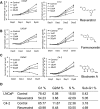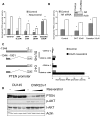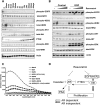Resveratrol regulates the PTEN/AKT pathway through androgen receptor-dependent and -independent mechanisms in prostate cancer cell lines
- PMID: 20729295
- PMCID: PMC2957324
- DOI: 10.1093/hmg/ddq354
Resveratrol regulates the PTEN/AKT pathway through androgen receptor-dependent and -independent mechanisms in prostate cancer cell lines
Abstract
The tumor suppressor gene PTEN (phosphatase and tensin homolog deleted on chromosome 10) and the androgen receptor (AR) play important roles in tumor development and progression in prostate carcinogenesis. Among many functions, PTEN negatively regulates the cytoplasmic phosphatidylinositol-3-kinase/AKT anti-apoptotic pathway; and nuclear PTEN affects the cell cycle by also negatively regulating the MAPK pathway via cyclin D. Decreased PTEN expression is correlated with prostate cancer progression. Over-expression of AR and upregulation of AR transcriptional activity are often observed in the later stages of prostate cancer. Recent studies indicate that PTEN regulates AR activity and stability. However, the mechanism of how AR regulates PTEN has never been studied. Furthermore, resveratrol, a phytoalexin enriched in red grapes, strawberries and peanuts, has been shown to inhibit AR transcriptional activity in prostate cancer cells. In this study, we use prostate cancer cell lines to test the hypothesis that resveratrol inhibits cellular proliferation in both AR-dependent and -independent mechanisms. We show that resveratrol inhibits AR transcriptional activity in both androgen-dependent and -independent prostate cancer cells. Additionally, resveratrol stimulates PTEN expression through AR inhibition. In contrast, resveratrol directly binds epidermal growth factor receptor (EGFR) rapidly inhibiting EGFR phosphorylation, resulting in decreased AKT phosphorylation, in an AR-independent manner. Thus, resveratrol may act as potential adjunctive treatment for late-stage hormone refractory prostate cancer. More importantly, for the first time, our study demonstrates the mechanism by which AR regulates PTEN expression at the transcription level, indicating the direct link between a nuclear receptor and the PI3K/AKT pathway.
Figures





Similar articles
-
Liposome encapsulation of curcumin and resveratrol in combination reduces prostate cancer incidence in PTEN knockout mice.Int J Cancer. 2009 Jul 1;125(1):1-8. doi: 10.1002/ijc.24336. Int J Cancer. 2009. PMID: 19326431
-
Conditional expression of PTEN alters the androgen responsiveness of prostate cancer cells.Prostate. 2006 Jul 1;66(10):1114-23. doi: 10.1002/pros.20447. Prostate. 2006. PMID: 16637073
-
Decorin suppresses prostate tumor growth through inhibition of epidermal growth factor and androgen receptor pathways.Neoplasia. 2009 Oct;11(10):1042-53. doi: 10.1593/neo.09760. Neoplasia. 2009. PMID: 19794963 Free PMC article.
-
Role of PI3K-AKT-mTOR Pathway as a Pro-Survival Signaling and Resistance-Mediating Mechanism to Therapy of Prostate Cancer.Int J Mol Sci. 2021 Oct 14;22(20):11088. doi: 10.3390/ijms222011088. Int J Mol Sci. 2021. PMID: 34681745 Free PMC article. Review.
-
Interplay Among PI3K/AKT, PTEN/FOXO and AR Signaling in Prostate Cancer.Adv Exp Med Biol. 2019;1210:319-331. doi: 10.1007/978-3-030-32656-2_14. Adv Exp Med Biol. 2019. PMID: 31900915 Review.
Cited by
-
Modulation of the tumor microenvironment by natural agents: implications for cancer prevention and therapy.Semin Cancer Biol. 2022 May;80:237-255. doi: 10.1016/j.semcancer.2020.05.009. Epub 2020 May 26. Semin Cancer Biol. 2022. PMID: 32470379 Free PMC article. Review.
-
Gnetin C in Cancer and Other Diseases: What Do We Know So Far?Nutrients. 2025 Feb 28;17(5):863. doi: 10.3390/nu17050863. Nutrients. 2025. PMID: 40077738 Free PMC article. Review.
-
Resveratrol Impairs Insulin Signaling in Hepatic Cells via Activation of PKC and PTP1B Pathways.Int J Mol Sci. 2025 Aug 1;26(15):7434. doi: 10.3390/ijms26157434. Int J Mol Sci. 2025. PMID: 40806567 Free PMC article.
-
Nanostructured Lipid Carriers Deliver Resveratrol, Restoring Attenuated Dilation in Small Coronary Arteries, via the AMPK Pathway.Biomedicines. 2021 Dec 7;9(12):1852. doi: 10.3390/biomedicines9121852. Biomedicines. 2021. PMID: 34944670 Free PMC article.
-
Biological Mechanisms by Which Antiproliferative Actions of Resveratrol Are Minimized.Nutrients. 2017 Sep 21;9(10):1046. doi: 10.3390/nu9101046. Nutrients. 2017. PMID: 28934112 Free PMC article. Review.
References
-
- Jemal A., Siegel R., Ward E., Hao Y., Xu J., Thun M.J. Cancer statistics, 2009. CA. Cancer. J. Clin. 2009;59:225–249. doi:10.3322/caac.20006. - DOI - PubMed
-
- Solit D.B., Scher H.I., Rosen N. Hsp90 as a therapeutic target in prostate cancer. Semin. Oncol. 2003;30:709–716. doi:10.1016/S0093-7754(03)00346-4. - DOI - PubMed
-
- Visakorpi T., Hyytinen E., Koivisto P., Tanner M., Keinanen R., Palmberg C., Palotie A., Tammela T., Isola J., Kallioniemi O.P. In vivo amplification of the androgen receptor gene and progression of human prostate cancer. Nat. Genet. 1995;9:401–406. doi:10.1038/ng0495-401. - DOI - PubMed
-
- Gregory C.W., Hamil K.G., Kim D., Hall S.H., Pretlow T.G., Mohler J.L., French F.S. Androgen receptor expression in androgen-independent prostate cancer is associated with increased expression of androgen-regulated genes. Cancer Res. 1998;58:5718–5724. - PubMed
-
- Eng C. PTEN: one gene, many syndromes. Hum. Mutat. 2003;22:183–198. doi:10.1002/humu.10257. - DOI - PubMed
Publication types
MeSH terms
Substances
LinkOut - more resources
Full Text Sources
Medical
Research Materials
Miscellaneous

